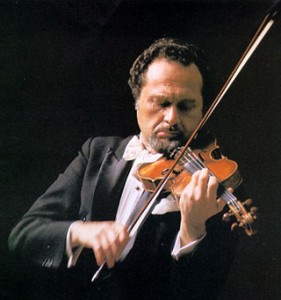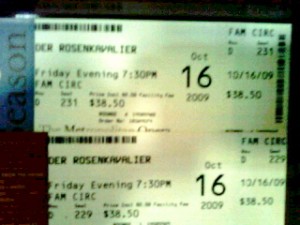
Violinist Aaron Rosand relinquished his violin in a London hotel last week after more than half a century with the instrument. Rosand sold the instrument because he “had” to; he wanted to ensure it will be played as he approaches his golden years—a contingency to which the Russian billionaire who bought the violin agreed.
Rosand says parting with the instrument “felt as if I left part of my body behind.” The Guarneri del Gesu was made in 1741, and previously belonged to violinist Paul Kochanski, earning it the nickname “ex-Kochanski.” Rosand spent his career with that violin, and says he sold it to make sure it continued to see the hands of capable violinists.
Although his performing days are waning, Rosand is staying involved with the arts—particularly his Alma Mater, The Curtis Institute of Music. Mr. Rosand has already donated $1.5 million to the conservatory after the sale, and intends to continue giving. The price tag of his instrument: $10 million.
Source: NY Times.
Archive for October, 2009
Aaron Rosand Says Goodbye to His Guarneri
Here’s Lookin at You Kid
Newsweek: Classical Music’s Version of Dodgers vs. Yankees: A Youthquake Hits Both Coasts
California Remains Attached

Before the Dodgers relinquished their chance at the Series, Newsweek featured an article capitalizing on the potential bi-coastal competition and profiled the two conductors who recently claimed their coasts: Alan Gilbert and Gustavo Dudamel. Author Seth Colter Walls asserts that the LA and NY Philharmonics are not in competition, but instead share the goal of bringing conductors’ names into American—even international—homes.
Citing that both conductors have already commissioned and premiered works by well known composers, Walls indicates the pair intend to, and are capable of renewing interest in new music and bringing young audiences to concert halls. Click to read the Newsweek article containing the words “buttress” and “contemporaneity.”
Gilbert, NY Philharmonic Visit Vietnam

Alan Gilbert and the New York Philharmonic just took another giant step forward in its establishment as a self-proclaimed goodwill ambassador for the U.S. Presenting two concerts in Hanoi last weekend. The event marked their first visit to communist Vietnam since the war between our countries ended over three decades ago. An estimated one-third of the tickets went to sponsors and government officials, with the remainder sold to the general public. Reportedly, the cheapest tickets were around two million dong, or $115 US.
Even though ticket prices were sky high, the concerts nevertheless did sell out. But this did not wholly exclude the remaining music lovers in the area, as they could watch for free on two large screens with speakers set up outside the Hanoi Opera House. AFP spoke with laborers and cab drivers who gave up a nights work to watch the concert.
The program included Beethoven’s Piano Concerto No. 4, with Emanuel Ax as soloist, as well as Beethoven’s Symphony No. 7. A full account from AFP writer Ian Timberlake after the break.
NY Philharmonic Holds Debut Performance In Hanoi
A Music Lover’s Stimulus Package
Pay Attention Orchestra Directors

Listen up people. We’ve all heard about Obama’s stimulus package. But since that hasn’t come through yet, how about a symphony subscription stimulus? The Pasadena Symphony and POPS is currently offering a buy one, get one free deal for all new subscribers.
If you’re a frequent reader of The Sound Post, you’re familiar with my stance on the importance of not just selling tickets, but getting people in the seats. It’s no secret that orchestras rely on gifts and donations in order to stay out of the red. Tickets that have been sold but end up on scalpers’ desks the night of a performance aren’t of service to anyone. This is going to bring in those big checks the ensembles need.
View Full Article »
Breaking News: Musicians Hear Better
At Least Pretend To Be Surprised

According to studies presented at the annual meeting of the Society of Neuroscience, “musical training can improve your hearing”. Go figure. Don’t worry it gets more interesting.
Studies in the past have determined that musical training does not help a person’s ability to pick out voices in a noisy room. This year, a similar study was conducted: but instead of picking out human voices, the subjects had to pick out their respective instruments. This time around the results were quite different.
Right now you’re thinking, thanks captain obvious. This is probably not surprising news. But it was interesting to some of the country’s top neuroscientists because of it’s implications into how we treat language disabilities in children. Pitch, timing, and tone quality: the three most important aspects of language recognition. Our ability to quickly detect these attributes determine our lingual cognition.
Nina Kraus, director of the Auditory Neuroscience Laboratory at Northwestern University, explains that musicians are excelling where children with language disabilities are falling short. While nothing has been done yet using this theory, it opens up a gateway for experimental treatments of dyslexia and other impairments.
An excellent article from NPR below, please check it out. Credit to author Jon Hamilton.
Say What?! Musicians Hear Better
It Pays To Be Offstage
Daily Dose Of Irony

How do you get to Carnegie? Practice. How do you make the most money? Get off the stage.
An article on Bloomberg.com provides some astonishing information regarding employee salaries at the renowned venue. During the fiscal year ending in June 2008, the average income of the full-time stage crew (carpenters and electricians) was $430,543. Exempt from that statistic is Dennis O’Connell, who supervises props at the hall, and made $530,044.
While not mentioned in the article, I think it’s safe to say that no Carnegie Hall musician comes even close to matching that. The only employee of the hall which surpasses the stagehands is Artistic and Executive Director Clive Gillinson, who pulled in $946,581.
So where does this discrepancy come from? The union. Joshua Free, a labor historian from Queens College, suggests that the ability of the workers union to essentially shut down the nucleus of New York’s entertainment district give them the upper hand in contract negotiations.
For more information, check out the full article on Bloomerg.com.
Stagehand Moving Props Makes $530,044 at N.Y.C.’s Carnegie Hall
A Night At The Met: Verdict – They Still Got It
And Renée Flemming is still beautiful

Most news coming from the Metropolitan Opera these days has not been uplifting. From the boos toward director Luc Bondy after Tosca, to the similar signs of vexation shown to maestro Daniele Gatti after Aida, this native New Yorker is a tad worried that we are developing a penchant for being hard impossible to please. Could this reputation possibly prevent performers from coming to New York? Probably not, since New York is “where dreams are made,” after all. However, I’m afraid we may yet become known as a city full of critics—not the art lovers and appreciators we are. Because I had not yet visited my favorite opera house this season, I splurged and purchased tickets for myself and a musician-colleague to Friday night’s performance of Der Rosenkavalier featuring Renée Fleming.
Perhaps it was the mediocre review given by the New York Times on Tuesday’s opening night, the flowing negativity for the other two productions currently at the venue, or the absence of James Levine, but let’s just say that I was hesitant to purchase last-minute-tickets for the sold out show (thanks to allshows.com for the tickets, but damn you for the 200% inflation without even delivering them to will-call). Upon arriving and immediately ordering champagne with the last of my cash, I took my seat.
View Full Article »
Pittsburgh In Red, Despite Strong Ticket Sales
More hapless news, this time coming from the Pittsburgh Symphony Orchestra. In a press conference on Wednesday, Richard Simmons, chairman of the orchestra, revealed that even strong ticket sales cannot come close to balancing out the effects of the national economic crisis.
The PSO announced that ticket sales were up by roughly $40,000. Good news considering most orchestras are declaring the contrary. Unfortunately, the budget deficit is totaling nearly half a million. Fault can be attributed to a decreasing endowment, as well as the dismissal of a special tax deduction which the PSO had been cashing in on (for corporations giving to nonprofit organizations).
To help the deficit, 11 administrative jobs have been cut. Not exactly what we like to hear these days. Patrons have been more than helpful, as gifts to the orchestra total $279,000.
Hopefully this season will bring in some luck to one of the country’s top organizations. Original article from the Pittsburgh Post-Gazette below.
Economy took toll on symphony’s artistically bright year





